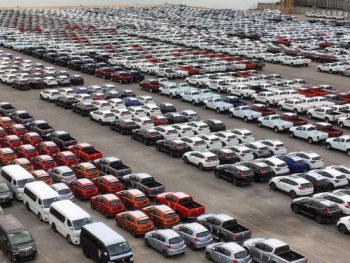UK registrations of new light commercial vehicles fell 22.2% in November due to the continued semiconductor shortages.

A total of 24,352 vans joined UK roads last month, compared to 31,320 in the same month for 2021. While the scale of decline is artificially inflated due to last November’s record-breaking performance, the total is the lowest recorded for the month since 2013 and is some 13.4% below the pre-pandemic five-year average, according to the Society of Motor Manufacturers and Traders (SMMT).
The problem remains with the ongoing supply chain issues, rather than an actual lack of demand, and declines were seen across most of the sector. Small vans of 2.0 tonnes or under were hardest-hit and fell 70.9%, followed by mid-weight vehicles weighing up to 2.5 tonnes, which dropped 63.5%.
The most popular segment, large vans from over 2.5 tonnes to up to 3.5 tonnes, declined by 17.9%. Meanwhile, pick-ups grew for their second consecutive month and 4×4 sector lines grew for their third, with registrations up 26.1% and 167.1% respectively – but such smaller-volume sectors are always more volatile.
The YtD picture paints the impact of the component shortages in more relief – the market has declined in each month of the year, except for September, and registrations are down 20.1% in the year to date at 260,314 units and some 23.2% off pre-pandemic volumes.
But market growth is predicted to return in 2023 as supply shortages hopefully ease – although the Government is being urged to take action to support success and drive fleet renewal.
More positive news comes from battery electric van (BEV) registrations, which continued to climb as operators plan for the 2030 ICE ban. BEV uptake rose by 14.8% in November to reach 8.1% of the market – up from 5.5% in 2021. YtD, BEV volumes are up 46.5% year on year and with a 5.8% market share now, although concerns remain over a lack of public charging infrastructure, particularly for commercial vehicles.
Mike Hawes, SMMT chief executive, said: “The UK van market has experienced a very difficult year, battling a multitude of challenges to meet demand, but has benefited from an EV boost as operators increasingly make the switch to zero emission.
“As supply constraints ease, we look with some optimism towards next year and a return to growth. It is imperative, however, that government takes action to help accelerate commercial vehicle recharging infrastructure, so that the vehicles that keep Britain moving can fully deliver on their ability to boost the economy.”

